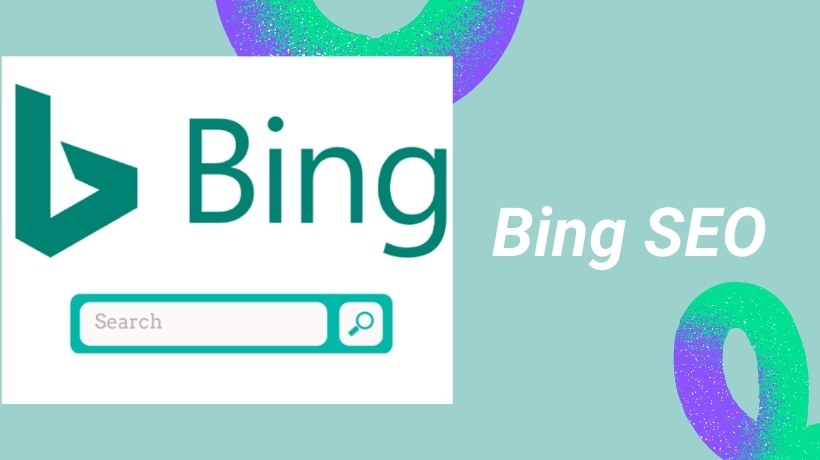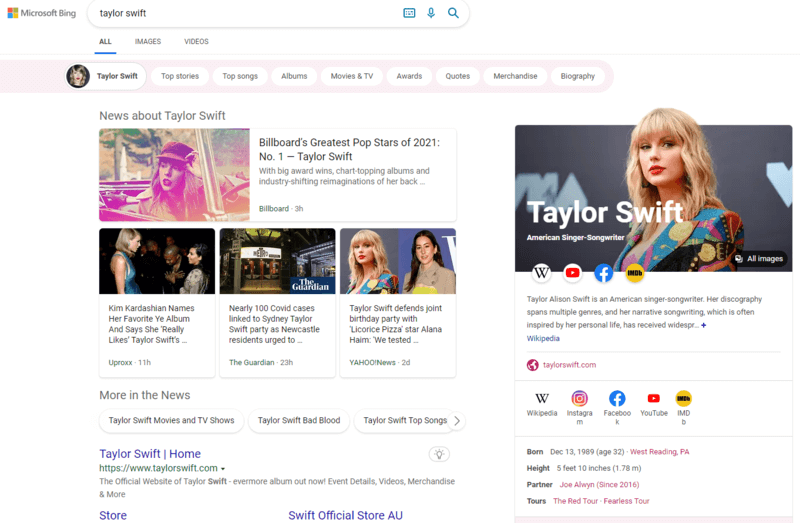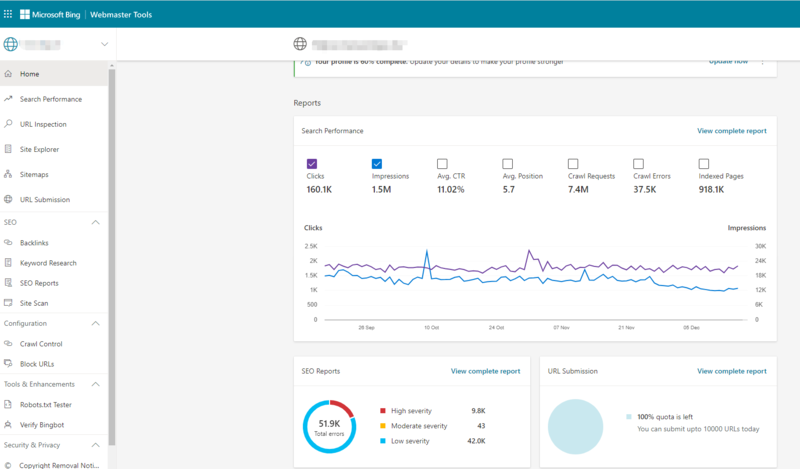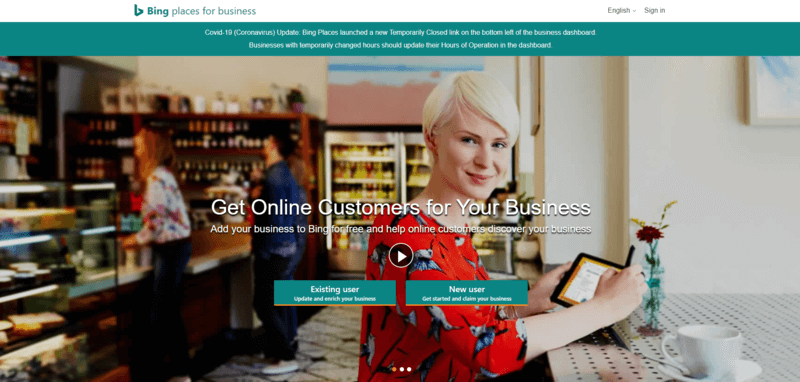Bing SEO: How to Increase Your Bing Search Traffic in 2023
When it comes to SEO, the first thing that probably comes to mind is Google optimization. However, do you know that Bing is number 2 search engine in the world after Google.
Definitely, Bing is small in comparison to a search engine giant like Google, but it holds a great market share in many countries particularly in the US. So if you’re someone who’s targeting countries like the US to get better organic visibility for your website, you should NOT ignore Microsoft Bing.
This article contains all you need to know about Bing and Bing users, the main differences between Google and Bing, and how to rank higher on Bing.
Let’s dive in to see if you know enough about Bing and why is it the right time to stop ignoring it.

Contents
It’s fair to wonder if investing time and resources in Bing is worth it. After all, Google dominates the search engine market.
Admit it. Not all webmasters plan their SEO strategy specifically for Bing. If you are one of them, here are some eye-openers for you…
- In September 2021, online search engine Bing accounted for nearly 7 percent of the global search market, while market leader Google had a market share of 86.64 percent. Meanwhile, Yahoo’s market share was 2.75 percent during that period. (Statista)
- In June 2021, close to 1.08 billion unique global visitors had visited Bing.com, up from 935.8 million visitors in February 2021. (Statista)
- Bing’s market share for desktop in the US market is 13.48%, 5.63% for tablet, and 2.83% for mobile. (The Wall Street Journal, 2020)
- 32.01% of traffic to Bing on desktop comes from the US. In second place is China with a 24.45% share in Bing visits, followed by Japan with 5.93%. (Similarweb, 2021)
- 57% of Bing users worldwide have children living at home. In addition, 53% of Bing users are married. (Microsoft Advertising, 2021)
- 34% of Bing users worldwide have a college degree. Meanwhile, 35% have a household income in the top 25%. (Microsoft Advertising, 2021)
Even though Bing’s audience is not the largest in the market, there are some advantages to investing in this search engine.
1. Bing Has Lower Competition
Truth be told, the majority of websites focus only on optimizing for Google, leaving the other search engines behind, hence unconsciously allowing Bing develop a fertile search environment where there’s not much of a competition and brands could easily rank high.
2. Bing’s Exclusive Users
Not everyone uses Google, and this ends up generating an audience made up of exclusive Bing users. To illustrate this information, 72% of all searches on Bing about finance and business are from users that are not on Google or other search engines.
Also, While Google serves a more general audience, Bing caters to a more mature set of users who have families and sizable household incomes.
3. Bing Currently Powers Yahoo and the Majority of Voice Search
For many years now, beginning July 2009, to be exact, Yahoo search has been powered by Bing meaning that the former’s searches are backed by Bing’s index and ranking algorithm. Hence, optimizing for one should please the other as well, at least when looking at the bigger picture.
5. Most Google SEO Practices Apply to Bing as Well
Many people worry that while they might be adept at SEO practices for Google, they are clueless when it comes to optimizing for Bing and other search engines. While the search algorithms of Google and Bing are different, some of their SEO best practices are similar, meaning you can fairly easily get the best of both search engines with one strategy.
Note: Should you decide to use Google SEO tactics for Bing, make sure you check the impact these practices might have on your Bing ranking.
Bing Ranking Factors

Unlike Google, Bing is much more transparent about ranking factors; just check their Bing Webmaster Guidelines and case studies and you’ll agree.
Below is a high-level overview of the main parameters Bing uses to rank pages in search results.
- Relevance: Relevance refers to how closely the content on the landing page matches the intent behind the search query. This includes matching terms directly on the page as well as terms used in links referring to the page. Bing also considers semantic equivalents, including synonyms or abbreviations, which may not be exact matches of the query terms but are understood to have the same meaning.
- Quality and Credibility: Determining the quality and credibility (QC) of a website includes evaluating the clarity of purpose of the site, its usability, and presentation. QC also includes an evaluation of the page’s authoritativeness, which includes such factors as the author’s or site’s reputation, the level of discourse (for example, an article with citations and references to data sources is considered higher quality than one that does not explain cite data sources), the completeness of the content, and transparency of authorship.
- User engagement: Bing also considers how users interact with search results. To determine user engagement, Bing asks questions like: Did users click through to search results for a given query, and if so, which results? Did users spend time on these search results they clicked through to, or did they quickly return to Bing? Did the user adjust or reformulate their query? The Bing Webmaster Dashboard will provide insights into how users interact with your webpages.
- Freshness: Generally Bing prefers content that is more “fresh” – meaning that the page consistently provides up-to-date information.
- Location: In ranking results Bing considers where the user is located (country and city), where the page is hosted, the language of the page, or the location of other visitors to the page.
- Page load time: Slow page load times can lead a visitor to leave your website, potentially before the content has even loaded, to seek information elsewhere. Bing may view this as a poor user experience and a less useful search result. Faster page loads are always better, but webmasters should balance absolute page load speed with a positive, useful user experience.
Bing SEO vs. Google SEO
While Bing and Google share many of the same SEO and ranking factors, there are a few key differences you should be aware of.
Based on the ranking information provided by Bing and Google, here are a couple of the ways that the two search engines rank content differently:
- Keywords: While Google examines the keyword context as well as the keywords themselves, Bing focuses more on the precise keyword(s).
- Backlinks: Google puts more emphasis on quality while Bing focuses more on quantity.
- Social signals: Google uses social media signals to understand brand credibility. Bing uses social media signals primarily when it comes to backlink analysis.
- Domain names: Bing favors official domains like .edu or .gov more than Google does.
- Click metrics: Google hasn’t explicitly stated that click metrics impact rankings, while Bing has.
Despite the differences between these two, there are still a number of things Bing and Google have in common in regards to SEO. High quality backlinks are one thing you’ll need to consider for both Google SEO and Bing SEO. While Bing does slightly favor quantity over quality compared to Google, both will require good quality backlinks. You will also need geo-specific keywords in your content since both Google and Bing take location into consideration for the search results.
How to Rank Higher on Bing Search: 10 Best Practices for Bing SEO
Optimizing your Bing SEO for organic traffic is easy if you’re already familiar with basic Google SEO. However, there are a few key points you’ll want to prioritize.
1. Getting Started with Bing Webmaster Tools
Bing Webmaster Tools is a free tool that includes a ton of useful tools including a keyword research tool, outbound links controller with the disavow option, a reporting tool, and more.
In details, Bing Webmaster Tools tells you;
- The health of your website
- Number of pages being indexed by Bing
- Number of links pointing to your site
- How to troubleshoot crawler access issues
- Detail information on keywords and position in search results
So the very first step which you should take it to make your account on Bing Webmaster Tools and submit your website in it.
First, you will need an account. Start by signing up for Bing Webmaster Tools.
Then we can start submitting and verifying our URLs.
If you have your website already verified through Google Search Console, you can simply just import the settings, and you’re good to go.
For manual setup, you have three options to choose from:
- An XML File
- HTML Meta Tag
- Or Add CNAME record to DNS
Once verified, you can submit your site’s sitemap in Bing webmaster tools which will help you in indexing your website and its pages fast on Bing search engine.

2. Target Exact Keywords
Even though Google has started understanding the meaning of a user’s searches and show results according to that. Bing still focuses on showing exact search results.
Exact keyword matches in page titles, sub-headers and on-page content are a must for improving Bing SEO performance. If you really want to attract more Bing traffic, you may find yourself trying to achieve more exact-match keywords on the page (without sounding unnatural).
3. Build (Quality) Links to Your Website
Just like Google, quality backlinks matter even for Bing SEO. The main difference between how Google and Bing use backlinks as ranking factors is that link count also matters much on Bing.
Bing still counts anchor text with your keyword as a good link. Searchmetrics has found that 53% of Bing’s top 30 search results have anchor texts.
Social links count as good backlinks as well.
Links from an old and authoritative website carry the highest value.
Also, links from the older websites will outweigh links from newer websites.
Moreover, links from .gov, .edu and .org are very important.
It may not be an important criterion for deciding rank on Google, but it is very important for Bing.
Social media signals are principal ranking factors or Bing. They take into account how many a link has been retweeted or shared on social media.
If you are a social influencer, your followers tend to share your information widely, which in turn results in Bing seeing these positive signals. These positive signals can have an impact on how your site ranks organically in the long run.
Just make sure you don’t follow social media schemes to artificially grow your social shares or followers (it might show a negative impact on your rankings in the long run).
5. Focus on User Engagement
Bing tells us upfront that it pays close attention to your website clicks and engagement. Fortunately, you should already be striving to create engaging content for Google SERPs as well. A few important strategies include:
- Make sure your headline is engaging, unique, and attention-grabbing.
- Ensure your body copy matches up to the headline.
- Write long-form content of over 1,000 words to answer questions thoroughly and keep visitors on your page.
- Include internal links so visitors feel compelled to stay on your site and learn more.
6. Ensure Your Site Speed
How long do your pages take to load? Slow pages are a nuisance to users. Your website’s load time also directly impacts how Bing ranks your pages.
Want to measure your site speed and/or find out how to improve it? We’ve published an in-depth guide on how to do just that. I’d recommend reading the full post, but some of the quick strategies are to:
- Optimize Images
- Minify CSS, JavaScript, and HTML
- Upgrade Hosting
- Reduce Redirects
- Defer JavaScript
- Minimize HTTP Requests
- Use A Content Distribution Network (CDN)
- Implement Google AMP
- Prioritize Above-The-Fold Content (Lazy Loading)
7. Use Bing Places
Like Google My Business, Bing Places for Business connects you with local customers. Bing benefits the sites that feature in its local listing, making it a critical Bing SEO ranking factor for organic traffic.
Your business can be automatically listed with Bing even if you have never used Bing before. If your business listing is already on Bing Places for Business, then verify your business and make any changes necessary. However, if you don’t have your business listed on Bing, you can add it by following Bing’s guideline given here.

8. Fresh Content
Bing tends to rank pages with up-to-date content. The means updating older articles and content pieces with the latest news, trends and studies, is a healthy practice.
9. Marking Up Content to Help Bing Understand It
Given the diversity of Bing’s SERP features, you should try taking advantage of them. To do so, you can mark your content with various specifications. Among others, Bing supports HTML, Microdata, Schema.org, and Open Graph.
10. Insist on Quality Content
Bing cares about the quality of the content as much as Google. Remember to factor in these elements when creating quality content for Bing:
- Be comprehensive and satisfy search intent.
- Write in a style that is appropriate for your target audience.
- Source the information and credit the author whenever possible.
- Format and present content in a way that is easy to follow.
- Maintain a clear distinction between sponsored and owned content.
Final Thoughts on Bing SEO Guide
Do you optimize your website for Bing SEO? If not, you should start today.
By optimizing your website for Bing, not only will you potentially reach a wider audience and beat your competitors to the punch, you’ll also rank well on both Yahoo and Bing. Don’t forget that Bing powers Yahoo search.
If you’re already getting traffic from Google, you’ll find it easier to optimize for Bing. So why not target Bing as well to get more organic traffic to your website?
